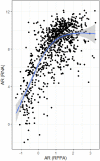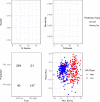Molecular features of androgen-receptor low, estrogen receptor-negative breast cancers in the Carolina breast cancer study
- PMID: 37438515
- PMCID: PMC10361868
- DOI: 10.1007/s10549-023-07014-x
Molecular features of androgen-receptor low, estrogen receptor-negative breast cancers in the Carolina breast cancer study
Abstract
Purpose: Androgen receptor (AR) expression is absent in 40-90% of estrogen receptor (ER)-negative breast cancers. The prognostic value of AR in ER-negative patients and therapeutic targets for patients absent in AR remains poorly explored.
Methods: We used an RNA-based multigene classifier to identify AR-low and AR-high ER-negative participants in the Carolina Breast Cancer Study (CBCS; N = 669) and The Cancer Genome Atlas (TCGA; N = 237). We compared AR-defined subgroups by demographics, tumor characteristics, and established molecular signatures [PAM50 risk of recurrence (ROR), homologous recombination deficiency (HRD), and immune response].
Results: AR-low tumors were more prevalent among younger (RFD = + 10%, 95% CI = 4% to 16%) participants in CBCS and were associated with HER2 negativity (RFD = - 35%, 95% CI = - 44% to - 26%), higher grade (RFD = + 17%, 95% CI = 8% to 26%), and higher risk of recurrence scores (RFD = + 22%, 95% CI = 16.1% to 28%), with similar results in TCGA. The AR-low subgroup was strongly associated with HRD in CBCS (RFD = + 33.3%, 95% CI = 23.8% to 43.2%) and TCGA (RFD = + 41.5%, 95% CI = 34.0% to 48.6%). In CBCS, AR-low tumors had high adaptive immune marker expression.
Conclusion: Multigene, RNA-based low AR expression is associated with aggressive disease characteristics as well as DNA repair defects and immune phenotypes, suggesting plausible precision therapies for AR-low, ER-negative patients.
Keywords: Androgen receptor; Carolina breast cancer study; DNA repair; Estrogen receptor; Multigene signature; Triple-negative breast cancer.
© 2023. This is a U.S. Government work and not under copyright protection in the US; foreign copyright protection may apply.
Conflict of interest statement
The University of North Carolina, Chapel Hill has a license of intellectual property interest in GeneCentric Diagnostics and BioClassifier, LLC, which may be used in this study. The University of North Carolina, Chapel Hill may benefit from this interest that is/are related to this research. The terms of this arrangement have been reviewed and approved by the University of North Carolina, Chapel Hill Conflict of Interest Program in accordance with its conflict of interest policies.
Figures



Update of
-
Molecular Features of Androgen-Receptor Low, Estrogen Receptor-Negative Breast Cancers in the Carolina Breast Cancer Study.Res Sq [Preprint]. 2023 Mar 22:rs.3.rs-2693555. doi: 10.21203/rs.3.rs-2693555/v1. Res Sq. 2023. Update in: Breast Cancer Res Treat. 2023 Sep;201(2):171-181. doi: 10.1007/s10549-023-07014-x. PMID: 36993425 Free PMC article. Updated. Preprint.
References
MeSH terms
Substances
Grants and funding
LinkOut - more resources
Full Text Sources
Medical
Research Materials
Miscellaneous

